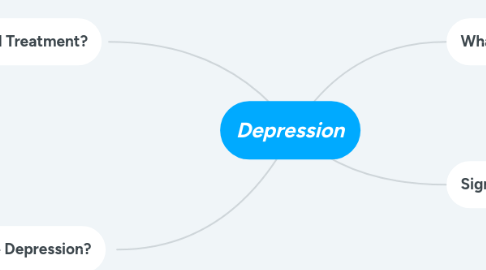Depression
by Nicole Bucao

1. Diagnosed and Treatment?
1.1. The first step to being diagnosed is to visit a doctor for a medical evaluation. Certain medications, and some medical conditions such as thyroid disorder, can cause similar symptoms as depression. A doctor can rule out these possibilities by conducting a physical examination, interview and lab tests. If the doctor eliminates a medical condition as a cause, he or she can implement treatment or refer the patient to a mental health professional.
1.1.1. Once diagnosed, a person with depression can be treated by various methods. The mainstays of treatment for depression are any of a number of antidepressant medications and psychotherapy, which can also be used in combination.
2. Who can have Depression?
2.1. Anyone!
3. What is Depression?
3.1. Clinical depression is a serious condition that negatively affects how a person thinks, feels, and behaves. In contrast to normal sadness, clinical depression is persistent, often interferes with a person’s ability to experience or anticipate pleasure, and significantly interferes with functioning in daily life. Untreated, symptoms can last for weeks, months, or years; and if inadequately treated, depression can lead to significant impairment, other health-related issues, and in rare cases, suicide.
4. Sign and Symptom?
4.1. A person is diagnosed with a major depression when he or she experiences at least five of the symptoms listed below for two consecutive weeks. At least one of the five symptoms must be either (1) depressed mood or (2) loss of interest or pleasure. Symptoms include: *Depressed mood most of the day, nearly every day *Markedly diminished interest or pleasure in activities most of the day, nearly every day *Changes in appetite that result in weight losses or gains unrelated to dieting *Changes in sleeping patterns *Loss of energy or increased fatigue *Restlessness or irritability *Feelings of anxiety *Feelings of worthlessness, helplessness, or hopelessness *Inappropriate guilt *Difficulty thinking, concentrating, or making decisions *Thoughts of death or attempts at suicide



